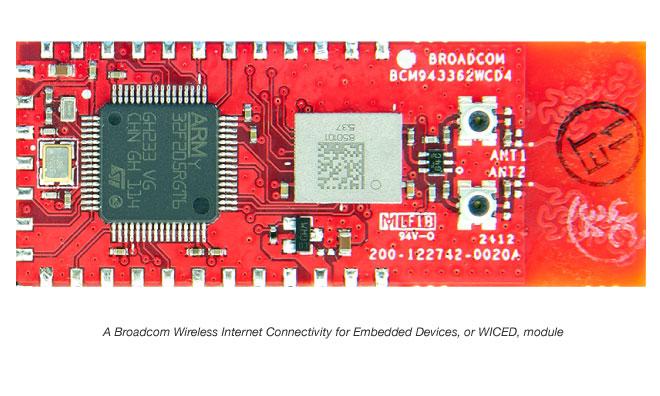Apple's AirPlay wireless streaming standard received a boost Monday when chipmaker Broadcom announced a new software development kit that makes it faster and easier for manufacturers to add AirPlay support to audio devices.
By combining the high-definition audio SDK and Broadcom's Wi-Fi hardware, accessory makers now have a relatively simple method for connecting speakers and audio devices with AirPlay. Broadcom's system abstracts away issues like multi-speaker synchronization and latency mitigation, freeing manufacturers to focus on other components and speeding up the development process.
In addition, manufacturers using Broadcom's platform are not required to separately integrate AirPlay components directly from Apple, further simplifying development. Broadcom touts the solution — Â which supports 802.11n — as a "turnkey" package.
For applications where audio quality is paramount, Broadcom has built in support for popular codecs like WavPack and Celt as well as multiple sampling rates including 44.1 KHz, 48 KHz and 96 KHz. The company says the new platform "improves synchronization and offers significant range benefits that enable multiple configurations with multiple speakers on the same Wi-Fi network," meaning future AirPlay-enabled wireless speaker systems could extend as far as Wi-Fi allows without the need for separate receivers.
The SDK is the newest addition to Broadcom's Wireless Internet Connectivity for Embedded Devices, or WICED, initiative aimed at enabling advanced Wi-Fi-based wireless networking for items like cameras, kitchen appliances, fitness equipment, and light switches. Broadcom marketing executive Rahul Patel told Tom's Hardware that "multiple first-tier OEMs" have WICED-enabled products in the pipeline for 2014, but declined to provide more specific information.
 Shane Cole
Shane Cole








 William Gallagher
William Gallagher
 Charles Martin
Charles Martin
 Christine McKee
Christine McKee
 Wesley Hilliard
Wesley Hilliard
 Malcolm Owen
Malcolm Owen
 Andrew Orr
Andrew Orr

 Sponsored Content
Sponsored Content







16 Comments
Great news. I want to be able to create a smart home one day, all controlled from my iDevices. So far only a Nest thermostat and also their smoke alarm ... I've long way to go :)
Get this into car radios, please.
[quote name="digitalclips" url="/t/161452/ces-2014-new-broadcom-sdk-makes-integrating-apples-airplay-easier-for-oems#post_2453826"]Great news. I want to be able to create a smart home one day, all controlled from my iDevices. So far only a Nest thermostat and also their smoke alarm ... I've long way to go :)[/quote] Smart homes have existed overseas for quite some time now. Can't believe that the US is so far behind.
I'd love to hear what country you hail from and what constitutes the standard smart configurations for homes in your area. The reason I ask is I think it's an issue of culture, affluence and a lackadaisical attitude towards environmental issues/energy consumption. I'll give you a for instance.
We are building a new house and we wanted it to be, you know, sort of smart. We have a Nest thermostat, LED bulbs (some are Phillips Hue), we want a Bluetooth lock.... Really I would like my home to know where I'm at and provide light. No switches, low power bulbs, etc. We also wanted an on-demand hot water heater and efficient HVAC/Furnace. The prices we got back from the builders were ASTRONOMICAL. They wanted $800 to install 16 LED bulbs in ceiling canisters. Not smart bulbs... just... LED. Why would you charge $50 per bulb for that? Nest installation (which a five year old could do) was something like $500. The improved efficient furnace was like $2000 and the on-demand hot water heater was $3000. The builder didn't even understand what we meant by a "Bluetooth enabled lock"
In the end, we didn't preorder any of these smart features because they were too expensive and the cost of energy isn't that expensive. However, we know the price of energy will continue to go up. I think there could also be a conspiracy going on with manufacturers and the energy companies which inhibit this in new construction. Imagine what would happen if all new construction had all the energy efficiency! That's right, the money wouldn't be flowing in like it used to. That may be a little extreme, but I do believe that manufacturers make standard and inefficient technology cheap to builders so it's included in the price.
So this means to make our home smart, we need to do it ourselves. This means that CES should be about the consumer electronics industry making it easy for homeowners to install and operate these devices. I would LOVE to have DC electric run through the house. Why have to convert all my AC to DC power for LED bulbs? It's dumb and inefficient. We have to install the Nest and plug in the LED smart lights. I'll need to rip my door apart and install a bluetooth lock and I'm working on an app for controlling all of this. In the end though, the average American household has a light switch wired to an incandescent light bulb. Kind of old school.
Any way, I'd love to hear your perspective!
Rather than have turkeys install these things at exorbitant cost, just specify the cable you want and where it is to run. Have them terminate it in boxes (probably required for code in your area). Then add the devices you need. And have them run some empty pipe (1 1/2" plumbing pipe works well) with cord through it so you can add more stuff later.